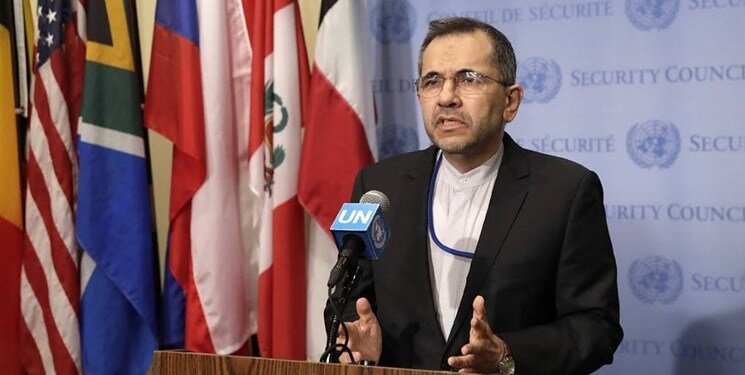Iran rejects involvement in attacks on American facilities in Iraq

TEHRAN - In a letter to the president of the Security Council, the Ambassador and Permanent Representative of the Islamic Republic of Iran to the United Nations stated that Iran has not been directly or indirectly involved in any attacks on U.S. personnel or facilities in Iraq, Fars News reported.
In response to a recent letter from the U.S. ambassador to the UN, Majid Takht Ravanchi denied the allegations against Iran and strongly condemned the recent U.S. attacks in Syria and Iraq, which he described as a violation of the UN Charter.
U.S. Ambassador to the UN Linda Thomas-Greenfield recently claimed in a letter to the Security Council that recent U.S. airstrikes on the Iraqi-Syrian border were aimed at preventing “Iran-backed militias” attacks on U.S. personnel and facilities.
In his letter to the president of the Security Council, Majid Takht Ravanchi stated that he had stated several times in the past, including in his letters to the president of the Security Council, that the Islamic Republic of Iran was not involved, directly or indirectly, in any armed attack by any institution or individual against U.S. personnel or facilities in Iraq.
He added that, therefore, any attempt to implicitly or explicitly attribute such an accusation to Iran is inaccurate and lacks even the most obvious reliable information to prove it, and is completely baseless, and “therefore we categorically reject such claims.”
He noted, “We consider them legally invalid and devoid of any effect.”
Takht Ravanchi has emphasized that the Islamic Republic of Iran has categorically rejected the U.S. arbitrary interpretation of Article 51 of the UN Charter to justify its illegal military attack on Syria and Iraq on June 27 and strongly condemns these illegal actions, which violate the sovereignty of the two countries.
He pointed out that the U.S. argument that such attacks were carried out to “deter” the Islamic Republic of Iran and so-called “Iran-backed militias” from further attacks on U.S. personnel or facilities in Iraq has “no real or legal” basis.
He said such allegation is based solely on an arbitrary interpretation of Article 51 of the UN Charter, and that the U.S. attacks are a clear violation of international law, in particular Article 2 of the UN Charter.
The Iranian ambassador concluded by emphasizing that the recent U.S. attempt to accuse others in the region of covering up irresponsible and destabilizing activities or its attempt to divert attention away from its illegal and adventurous military actions in the region are doomed to failure.
Last week, the U.S. Department of Defense announced airstrikes on the positions of Iraqi and Syrian groups in the border areas of Iraq and Syria. The Pentagon said in an official statement that its fighter jets had targeted two weapons depots and military installations in Syria and a position in Iraq.
“Specifically, the U.S. strikes targeted operational and weapons storage facilities at two locations in Syria and one location in Iraq, both of which lie close to the border between those countries,” the Pentagon statement said, claiming that the facilities have been used by Kata'ib Hezbollah (KH) and Kata'ib Sayyid al-Shuhada (KSS).
The Pentagon also said that the airstrikes were carried out at the U.S. president’s direction and were in line with the U.S. “right to self-defense.” The Pentagon also justified its move by saying that the groups targeted were “Iran-backed militia groups,” which “are engaged in unmanned aerial vehicle (UAV) attacks against U.S. personnel and facilities in Iraq.”
Iran strongly condemned the attacks, describing them as fomenting further instability in the region.
Iranian Foreign Ministry spokesman Saeed Khatibzadeh said the airstrikes are a step in the wrong direction. “The U.S. still continues along the wrong road in the region,” the spokesman said.
Khatibzdeh said the U.S. air raids are yet another indication that the Biden administration is following in the Trump administration’s footsteps in terms of pursuing hostile acts against Iran whether by using sanctions or regional airstrikes.
“Unfortunately, not only in the field of imposing oppressive sanctions against the Iranian nation, but also in the field of regional behavior, we see the continuation of the failed U.S. policy and legacy in the region,” Khatibzadeh lamented.
He described the U.S. move as “sentimental,” calling on Washington to let the region’s people determine their destiny away from foreign interference.
“The advice to the new administration in the United States is to change its course instead of these sentimental behaviors and instead of creating crises and living in tension and creating problems for the people of the region, it should let the people of this region decide their own destiny without their intervention,” Khatibzadeh continued.
“What the United States is doing is disrupting regional security, and one of the victims of this disrupted regional security will be the United States itself in the region,” the spokesman pointed out.
